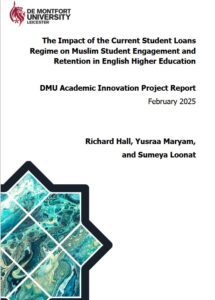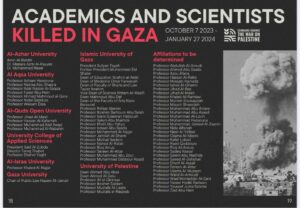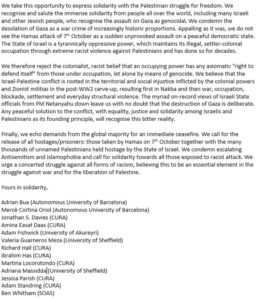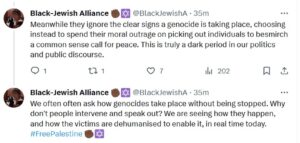Overview
I am really pleased that with Lucy Ansley, Sumeya Loonat and Lamia Nemouchi, we are being funded by The Aziz Foundation to undertake an audit focuses upon the wider, student experience of British Muslim, first-year undergraduate students at De Montfort University (DMU). It situates this experience against their faith, and also in relation to ethnicity, gender and disability, in order to understand how these students experience their Muslimness in higher education (HE) spaces. The intention is that this will materially impact the ways in which universities can recognise intersectional and faith-based complexities in the undergraduate student experience.
A primary gain will be for universities to consider how to enhance their engagement with the richness of British Muslim student identities, in order to support the retention of the students. A secondary gain will be for universities to put in place structures, cultures and practices that anchor their relationships with these groups of students, such that they are able to rebuild the bridge between undergraduate and postgraduate taught provision (Samatar, Sardar and The Aziz Foundation, 2023).
The audit connects to the Aziz Foundation’s proposed audit areas of faith provision, workplace culture/ inclusion, and academic experience. It specifically focuses upon all British Muslim, first-year students at DMU, who will begin their undergraduate study during academic session 2024/25. It has the following aim.
- To analyse how British Muslim, first-year students experience their Muslimness in HE spaces.
Higher Education spaces refers to the physical, and virtual environments and the institutional system in place within which the academic, social and personal development of the students occurs when pursuing higher education. HERE The audit has the following, linked objectives.
- To identify how British Muslim, first-year students perceive their religious identity (Muslimness) when planning to pursue HE.
- To identify intersectional factors, including ethnicity, gender and disability, that impact the experience of British Muslim, first-year students.
- To explore institutional strategies to ensure the retention of British Muslim, first-year students.
Background
Whilst much work has been undertaken in the United Kingdom (UK) on the awarding gap (see, for instance, Universities UK, 2022), this has often been conflated with work on decolonising (see, for instance, Hall, Ansley and Connolly, 2023; Shain et al., 2021). Within university access and participation plans, there has been a focus on student-centred approaches, belonging, and inclusive learning environments, although the pivot for this has tended to be the awarding gap, rather than social justice. Moreover, there has been a lack of focus upon students of faith in general and British Muslim students in particular (Stevenson 2014), and the socio-cultural practices and environmental factors that impact their belonging within UK HE (Islam, Lowe and Jones 2019).
This has tended to limit the opportunity for institutions to engage productively and generatively with the complexity of the student experience, and to enrich that experience. This is in spite of a history of reporting of the negative impacts on the British Muslim student experience (see, for instance, Office for Students, 2021), and the recommendation by Universities UK (2022) of the need for ‘A greater push to implement university-wide change is needed so that the work that universities are doing to create inclusive communities is fully reflected in students’ experiences.’ Whilst this is a complex terrain that focuses attention upon structural constraints and barrier, communal cultures, and individual and collective identities, deep work is required to enable HE institutions to engage with such complexity.
Yet, a range of issues impact the British Muslim student identities, including: support for the representation and expression of faith on campus; access to appropriate funding for study; Islamophobia (amplified recently in relation to Palestine); surveillance and the Prevent strategy; the relationship between universities, students unions, and Islamic societies; and, the availability of and access to appropriate, faith-based spaces and environments. Stevenson (2018) has highlighted the intersecting impacts of these issues with a clear focus upon the need for religious literacy. This is more important for institutions, precisely because the Muslim experience of HE ‘is not homogeneous, and their experiences are therefore shaped differently, which impacts on their life choices and outcomes’ (Malik and Wykes, 2018: 17). Hence, there is a need to understand these experiences in order to make HE as inclusive for British Muslim students as their non-Muslim/religious peers.
Our audit works from the basis that the concept of identity remains complex, multifaceted and intricately linked to cultural, social and historical contexts (Hall 1990). It recognises that the British Muslim student experience in UK universities is conditioned by a range of representations of Muslim people and Muslimness, which have tended to exacerbate the marginalisation and stigmatisation of Muslim individuals, or Muslimness as an identity facet (Ali and Whitham, 2018). This has also led to self-censorship (Guest et al., 2020). Of course, the impacts of traumatic events like the pandemic and the war on Gaza shape societal, institutional and individual representations. However, the audit team wish to use this complexity, in order to understand how these students internalise and express their Muslimness in relation to their specific learning environments.
The audit team wish to understand how the active or passive engagement of institutions with negative stereotypes about Islam can: first, contribute to the internalisation of feelings of othering, potentially affecting access of Muslim students to HE (Islam, Lowe and Jones 2019); second, shape their experience within HE to reinforce these self-perceptions through lived experience of microaggressions, subtle biases, exclusionary practices (Ahmed, 2012) or practices that neglect religious identities; and, third, understand how these students celebrate their identity in relation to Islam as a holistic system, or ‘a way of life, a code of laws, a complete system encompassing and integrating the political, social, and economic, as well as personal, moral, and spiritual aspects of life’ (Dabashi 1993: 439).
Research Overview
The audit team’s approach will utilise an interpretivist approach inside a mixed methods study. This will enable the collection and interpretation of data that are contextually-detailed, and will also reflect upon the positionality of the research team. In all of our work, researcher positionality is central, and needs to be clearly articulated in the context of this specific research.
As British Muslims, two of the Co-Investigators meet the study’s participant criteria (Loonat and Maryam), whilst a third member of the team has extensive fieldwork engagement with decolonial and faith-based experiences of education as an international, Muslim researcher (Nemouchi). Both the Principal Investigator (Hall) and fourth Co-Investigator (Ansley) have extensive experience in pedagogic and educational research, in relation to decolonising and anti-racist practice.
A final benefit for the project is its contribution to a culture of co-creation, which is well established within the Education Studies Division at DMU. Work with second-year British Muslim students, who have lived experience or awareness of the issues faced by their first-year peers, is central to this proposal. We intend that four current 1st year British Muslim students (cohort 2023/24) will be recruited to join the project team, in order to shape the evaluation and help discuss its findings.
This audit seeks to explore the lived experience of British Muslim first-year undergraduates through a qualitative approach that centres student voice. Using survey and focus group methods, students will be asked to reflect upon their early experiences on campus, in relation to their Muslimness. Reflexive thematic analysis will then be used to identify findings from the data, recognising the interaction between data and researchers (Braun and Clarke 2023).
An anonymous survey was drafted using themes from the literature surrounding Muslim student experience in HE. Themes such as university choice, accommodation, societies, campus facilities and relationships are discussed. These were considered through the lens of the initial stages of the undergraduate journey (Humphrey and Lowe 2017) before being further refined into three sections: application, welcome and first weeks. In this way, the survey will capture student reflections on this pivotal transition into higher education.
The existing literature highlights the many and varied ways in which British Muslim students are negatively impacted by their university experience, and so we did not want to take an overly deficit-based approach to our questioning, but rather to offer neutrally framed prompts that enable both positive and negative reflections. The survey will undergo consultation with our Student Advisors early in the autumn term before being launched in November. In addition to questions regarding their experience, demographic data will be gathered to provide an overview of the perspectives represented within the survey data, and allow for intersectional analysis. To ensure student anonymity, only faculty of study will be collected, meaning that students are not identifiable from their demographic information.
Focus groups will then be used to add greater depth to the themes emerging from the survey data, and to explore those question areas in more detail. A draft schedule was developed, influenced by the research literature, and this will also be presented to our Student Advisors for feedback. Alongside each focus group, the research team will make personal research memos about the sessions, noting atmosphere, distribution of participants and any non-verbal cues that may be of analytical significance, to provide additional context for the analysis process.
Researcher memos, or reflective diaries, will play a central role throughout the study and will be completed by both academic staff members and the Student Advisors. The diaries will focus upon the research team’s experience of the analytical and methodological process, as well as their positionality throughout. The research team believe that reflexivity is an iterative process, not a check box exercise, and that authentic exploration of researcher positionality is a continual exercise throughout a study (Gani and Khan 2024, Braun and Clarke 2023). The diary writing process is therefore a useful tool in supporting the research team in maintaining their reflexivity throughout.
NB within the study as a whole, religion or belief is a key inclusion/exclusion criterion, and as a result a full Data Protection Impact Assessment is required and has been signed off. All data will be managed in transit and at rest on encrypted, DMU technologies, and as soon as transcription has been undertaken, transcripts and original data files (voice recordings, field notes) will be destroyed by the PI from those technologies or by shredding as part of DMU’s management of confidential waste. Under the agreed DPIA there will be no way for the PI to contact participants individually. In order to maintain anonymity no linking data or emails will be stored. So, for instance, where students have moved on from DMU and are no longer members of the Prayer Room or Islamic Society we will not be able to contact them directly. Anonymity and confidentiality are key. Note that an Interim Report has been submitted to The Aziz Foundation. Once this is agreed it will be published on DMU’s Research Repository.
Hall, R. Ansley, L., Loonat, S., and Nemouchi, L. (2024). Scoping a Muslim friendly Universities audit: DMU Interim Report. De Montfort University/The Aziz Foundation. https://hdl.handle.net/2086/24270
References
The Aziz Foundation: https://www.azizfoundation.org.uk/.
Ahmed, S. (2012). On Being Included: Racism and Diversity in Institutional Life. Durham, NC: Duke University Press.
Allen, C. (2023) Everyday experiences of Islamophobia in university spaces: A qualitative study in the United Kingdom. Education, Citizenship and Social Justice. https://doi.org/10.1177/17461979231210996
Ali, N., and Whitham, B. (2018). The unbearable anxiety of being: Ideological fantasies of British Muslims beyond the politics of security. Security Dialogue, 49(5): 400-418. https://doi.org/10.1177/0967010618794050
Braun, V. and Clarke, V. (2023) Toward good practice in thematic analysis: Avoiding common problems and be(com)ing a knowing researcher. International Journal of Transgender Health, 24(1), pp. 1-6.
Dabashi, H. (1993). Theology of discontent: the ideological foundations of the Islamic Revolution in Iran. New York: New York University Press.
Gani, J.K. and Khan, R.M. (2024) Positionality Statements as a function of coloniality: interrogating reflexive methodologies. International Studies Quarterly, 68(2). https://doi.org/10.1093/isq/sqae038
Guest, M., Scott-Baumann, A., Cheruvallil-Contractor, S., Naguib, S., Phoenix, A., Lee, Y. and Al Baghal, T. (2020) Islam and Muslims on UK University Campuses: Perceptions and Challenges. Durham: Durham University, London: SOAS, Coventry: Coventry University and Lancaster: Lancaster University. https://eprints.soas.ac.uk/33345/1/file148310.pdf
Habermann, M. (2014) ‘Islamic Finance and the Student Loan Market for Muslim-Americans’, Undergraduate Journal of Humanistic Studies, 1, pp.1-13. Available at: http://carleton-wp-prod…07/Mike_Habermann_2.pdf
Hall, R., Ansley, L., and Connolly, P. (2023). Decolonising or anti-racism? Exploring the limits of possibility in higher education, Teaching in Higher Education. DOI: 10.1080/13562517.2023.2201676
Humphrey, O. and Lowe, T. (2017) Exploring how a ‘Sense of Belonging’ is facilitated at different stages of the student journey in Higher Education. Journal of Educational Innovation, Partnership and Change, 3(1). https://winchester.elsevierpure.com/files/340639/788788_Lowe_ExploringHowSenseofBelonging_original_deposit_with_set_statement.pdf
Islam, M. Lowe, I., & Jones, J. (2019). A ‘satisfied settling’? Investigating a sense of belonging for Muslim students in a UK small-medium Higher Education Institution. Student Engagement in Higher Education Journal, 2(2): 79-104.
Malik, A. and Wykes, E. (2018). British Muslims in UK Higher Education: Socio-political, religious and policy considerations. London: Bridge Institute. https://www.azizfoundat…er-Education-report.pdf
Samatar, A., Sardar, Z., and The Aziz Foundation (2023). Transitions: British Muslims between undergraduate and PGT studies. London: The Aziz Foundation.
Shain, F., Yıldız, U.K., Poku, V. and Gokay, B. (2021) From silence to ‘strategic advancement’: institutional responses to decolonising in higher education in England. Teaching in Higher Education. 26 (7-8): 920-36.
Stevenson, J. (2014). Internationalisation and religious inclusion in United Kingdom higher education. Higher education quarterly, 68 (1), 46-64
Stevenson, J. (2018). Muslim Students in UK Higher Education: Issues of Inequality and Inequity. London: Bridge Institute. https://www.azizfoundat…-Education-report-2.pdf
Universities UK (2022). Closing ethnicity degree awarding gaps: three years on #ClosingTheGap. London: Universities UK. https://www.universitie…-gap-three-years-on.pdf



